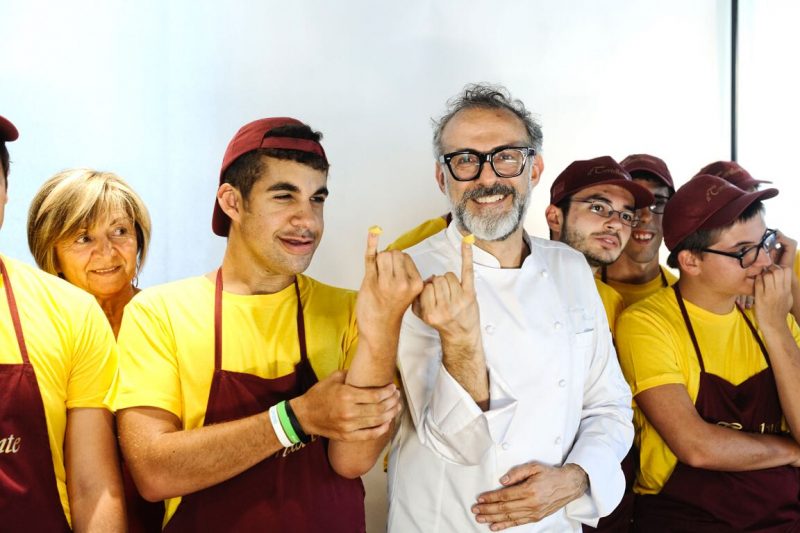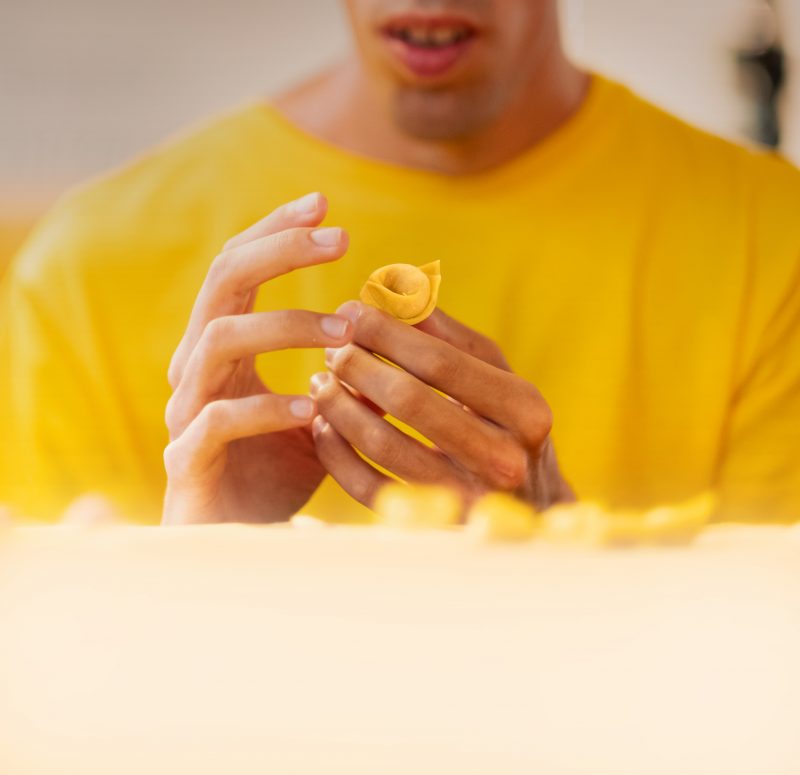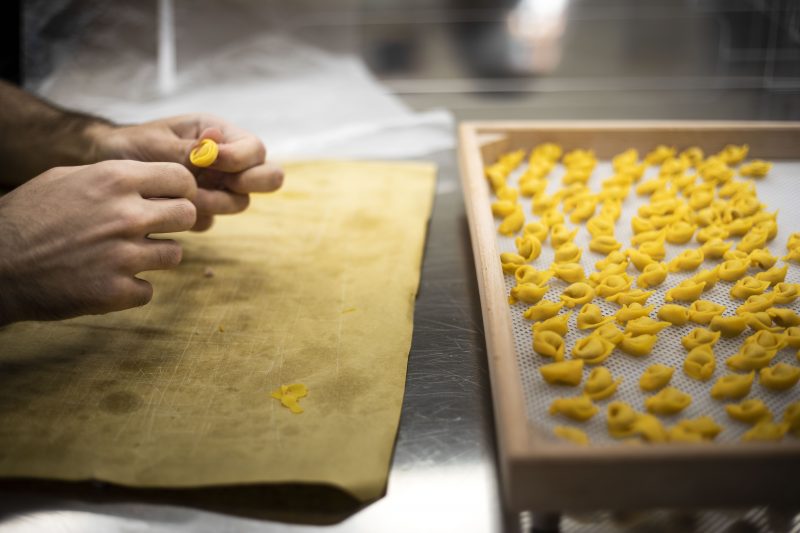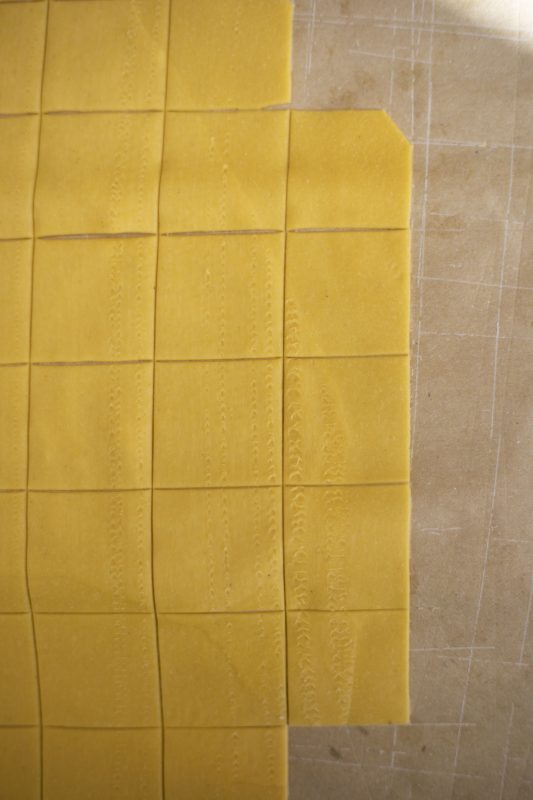This article originally appeared in the Fall 2021 print issue of Quench Magazine.
Massimo Bottura and his wife Lara Gilmore, from the three-star Osteria la Francescana in Modena, started a project for young adults with autism called Tortellante … a project that is both tasty and important.
“If you do that, your tortellini can’t lie on my tray,” Charlie says, shaking his head.
I am in Modena, trying to make tortellini with about ten young adults with autism. They all participate in the Tortellante project which started in November 2018 following an idea by Silvia Panini, a mother in Modena with an autistic son. She got the idea after seeing how her son enjoyed working in the kitchen and making pasta with his grandmother. Panini then contacted Massimo Bottura and Lara Gilmore, the couple who started one of the world’s most famous restaurants, the three-star Osteria Francescana in Modena. They quickly took up the idea because their son Charlie is also autistic.
Charlie is not happy with my tortellini, and I can honestly understand why. It is more difficult than it seems to fold and spin the small square of pasta without the filling falling out. Charlie, on the other hand, like his colleagues, works with efficient calm. Charlie’s tortellini are easy to recognize because they are pointed without folded edges. Mine are different and they do not fit in.
Today, at Tortellante, about twenty young adults between the ages of 16 and 25 with various forms of autism, work together in different shifts. When these young adults leave school, a big void awaits. Either they end up in a day care centre or they are back at home with the family. Through Tortellante they get a meaningful job, and they earn their own money.
“It’s mostly boys because autism mostly affects men, no one knows why,” says Lara Gilmore. She is full of positive energy and has a big smile on her face as she shows me around and talks about the project.
Tortellante is located in a yellow two-storey house in central Modena, inside the city’s former market for vegetables and fruit. Downstairs is the laboratory and kitchen, upstairs an office and dining room where the morning shift workers have lunch.

“We understood that something was not right with Charlie when he was six months old. He did not react like other children and his face grew in a strange way,” says Lara.
The search for a diagnosis took up more and more time, but getting an answer was something that turned out to be an almost impossible task.
“Charlie got his diagnosis when he turned sixteen, so it took a while,” says Gilmore, adding that the best advice she received was to concentrate on everyday life and not just on getting a diagnosis. “You really want to know and get answers, but it often takes a long time before doctors can say something with certainty because there are so many different shades of autism,” she says.
“Charlie is bilingual today, no one would have thought that would have been possible when he was little,” says Gilmore, who is originally from New York.
Charlie and his colleagues go to Tortellante every day. There is a morning and an afternoon session and on average Tortellante makes 650 kilos of tortellini every month. One kilo of tortellini costs about 35 euros. The project is self-financing and has customers such as Gucci, Maserati and TetraPak.
“Our project is socially important, but our tortellini must be of a high standard and really tasty,” says Gilmore, adding that the grandmothers, le nonne in Italian, who come to Tortellante and teach the long and proud tradition of making tortellini, are strict.
Nonna Loredana is one of them and she monitors the work with an attentive gaze. She is determined and welcoming at the same time, just as one would expect an Italian grandmother to be. Loredana has known Bottura and Gilmore since the beginning, long before Michelin stars and international attention. Among other things, it was Loredana who got to make fresh pasta in front of the famous French chef Alain
Ducasse, when he came to taste his apprentice Massimo’s dishes in the mid-nineties.
“When I retired, I did not have much to do, so when I was asked to come here, I answered yes immediately. It is incredibly rewarding for all of us who participate in this project,” she says
Loredana shows how to cut the thin pasta sheets into small squares and how to work the filling with pork, prosciutto di Modena, mortadella and parmigiano reggiano with practised movements. “For tortellini, you have to let the pasta dough go through the pasta machine until the last number to get it really thin, whatever pasta machine you use,” she says.
“Every tortellini reflects the person who makes them,” says Lore-dana, smiling as she looks at my bumpy little knots. I feel that they do not give a super positive reflection of my personality. Loredana shows once again with great patience what I should do to get a perfect tortellini, because this is not a game; on the contrary, this is serious business for everyone involved.
At Tortellante, there are also psychiatrists and psychologists who follow the daily routine. Alessandro Rebuttini and Martina Rossetti coordinate the work and together with the rest of the team they adapt a special program for each person.
“There are several touching stories about how our workers come home with their tortellini to the family and get a lot of positive attention. For many, it is the first time they feel that they are not an obstacle but on the contrary, a positive part of the family,” Gilmore explains.
Bottura and Gilmore are active in several social projects around the world and according to Bottura, well known chefs around the world should do more to make society better. Just cooking beautiful and delicious food is no longer enough.
In Modena, in addition to Tortellante, you find Massimo Bottura’s three-star restaurant Osteria Francescana and a more easy-going brasserie called La Franceschetta58. The latest addition is the luxurious country hotel, Casa Maria Luigia, where you can try Bottura’s historic dishes in an elegant yet relaxed setting.
“Think what a change we could make,” he says. Together with Gilmore, he has started Food for Soul, a project that takes food leftovers that are then prepared and served in a beautiful environment to the needy. Food for Soul is available today in the USA, Italy, France, Canada, Brazil and Peru.
After the morning at Tortellante I get to meet Bottura at home in his and Gilmore’s apartment in Modena. Walls and tables are covered with the family’s collection of modern art and Bottura often refers to artists, musicians and philosophers who have meant a lot to him.
“Culture provides knowledge. Knowledge leads to consciousness. And when we become aware, we are steps away from becoming socially responsible. Culture is the key,” says Bottura.
Both he and Gilmore believe that food traditions can be used to make a difference in society. They hope that the Tortellante project will be able to spread to other cities and countries where local food traditions can be used to start similar projects.
While we sit and talk, Charlie comes home after finishing his morning shift.
“How did Åsa do?,” Bottura asks, and Charlie makes an Italian hand gesture which means something like “not so good” and Bottura bursts out in a big loud laughter.
The young crowd at Tortellante are just as serious as the three-star chef. Because to all of them food is important and can make a difference
Photos provided by Osteria la Francescana



